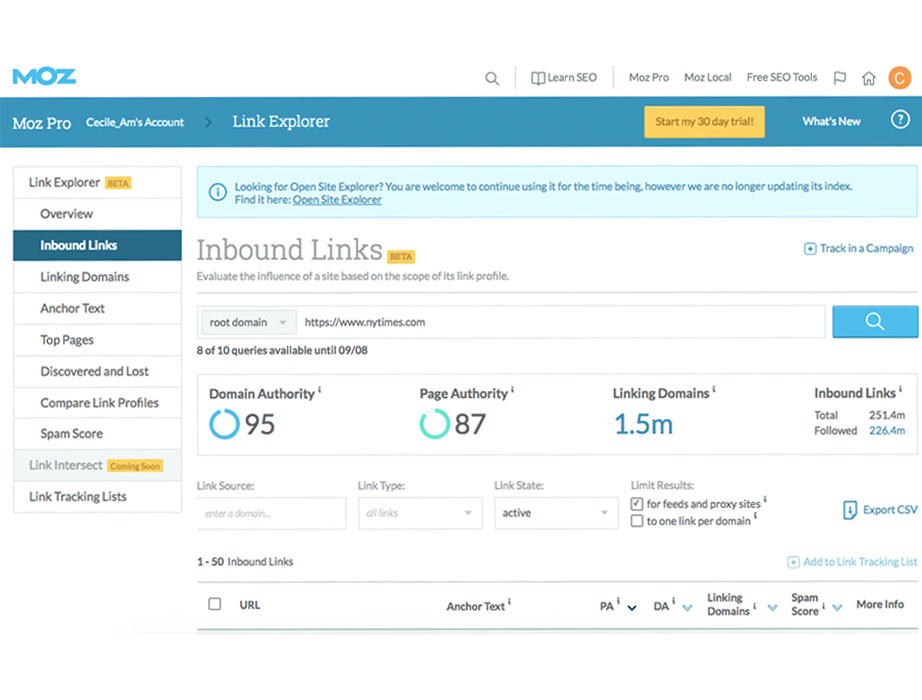BLOG/Strategy & Planning
Optimizing Your Website With A Link Building Strategy
No one would deny the importance of a well thought out SEO strategy for online businesses. There are several benefits to implementing SEO practices but the most important one is visibility; you want to make sure the content you spent hours researching and writing will be seen by your customers and that your products will appear at the top of the search engine when prospects are looking for them.
On average most people don’t go past the first five links of the search engine, let alone to the second page, so it’s important to understand the criteria used by the search engines to rank.
Improving your website ranking with backlinks is simple… well almost
Backlinks are one of the top factors in Google’s organic ranking algorithm. Backlinks are created when one website links to another. When a website links to your content it tells Google that people value your content enough to embed your website link onto their own, in other words, they are validating that your website’s content is valid. The more links to your website the better you will rank on Google. Simple, right? Well almost, the only trick is that Google values quality over quantity so it’s not enough to ask all your friends and family to link to your website, the links need to come from related and reliable sources.
Evaluating inbound link quality using metrics such as Page Authority and Domain Authority
Since the introduction of Penguin in 2012, an update to Google’s algorithm that aggressively penalized websites that pursued low-quality link building techniques (also called black-hat SEO), it’s no longer enough to have just a large quantity of websites linking to your content, Google robots will also look at the “health score” of the page that has linked to you.
Moz is a great SEO tool to use so that you can conduct backlink research for your website. They created their own metrics to estimate a website’s score heath called Page Authority and Domain Authority.
Page Authority (PA) is a score developed by Moz that predicts how well a specific page will rank on search engine result pages. The score will range from one to 100, one hundred being the highest score a website can get.
Domain Authority (DA) is a search engine ranking score developed by Moz that predicts how well a website will rank on search engine result pages. A Domain Authority score ranges from one to 100 as well.
 Image via Moz
Image via Moz
Let’s take a look at The New York Times’s score in Moz to illustrate those different concepts. As you can see in the image above the nytimes has a Domain Authority of 95/100 and a page authority of 87/100, they also have more than 1.5 million websites linking to them. The number of websites linking to the New York Times tells Google it’s an authoritative website with high-quality content.
Can your content score as well as the New York Times? Probably not. But, you do want to make an effort to generate links to your content from websites with high PA and DA scores in order to increase your rankings in Google. Tools such as Moz or SEMrush are great resources to conduct backlink analysis on your website and on the ones of your competitors.
6 tips to create your own link building strategy
Now that you know the importance of backlinks and the metrics to look for to generate good link building practices, let’s look at some actions you can take to create your own link building strategy.

- Do an in-depth audit of your backlinks. (This tip might not apply if you are just getting started with your website, in which case go directly to tip #3.)
Use Moz or SEMrush to conduct backlink research using the filters “follow” and look at the websites that link to your content, order the list and look at the PA and DA scores as well as the type of content they link to. What does your website health look like? Do you have quality websites linking to your content? Can you identify any topic that gets more links than others? This might give you some insight to fuel your content strategy as well.
- Get lost links back
Using the filter “lost” look at the website that used to link to your content and try to reach out to them. Sometimes websites will get redesigned or updated and the link that use to redirect to your website will be broken, so following up with them might be of benefit to both of you!
- Look at who is linking to your competitors
Run a new search by entering your competitor(s) url(s). Review some of the most reputable websites linking to them. Consider reaching out to see if they would have any interest in linking out to you as well. This may be especially true if you have content that may be of relevance to them that you think they would deem linkable.
- Use redirects when a page stops working
If you find links that lead to old content or 404 pages on your website, don’t lose those valuable links! First, try to reach out to those links and ask them to consider updating to a new, more relevant page on your website. If that doesn’t work make sure you redirect the old links to your home page or topic/product that are relevant.
- Get rid of toxic backlinks
As mentioned previously, not all links are equal, some of them are considered toxic. Put simply toxic backlinks are links that harm the search rankings of a website. Google’s Penguin update focuses on penalizing the websites that have bad backlink profiles. Therefore it’s important to block those domains from linking to your website. To do so download the list of domains considered toxic and go to the disavow link tool provided by Google Search Console to upload the file.
- Automate your link building
Now, this last tip might be a little tricky but it will save you a lot of time. Linkedin is a great resource to find people in your industry, using tools like Dux-Soup you can obtain a list of people to reach out to on Linkedin and ask them directly to generate a link to your latest or most popular piece of content. Once you know who you want to talk to you can also use Scrapebox to find people’s email address and Mailshake to mass message the emails you found to ask them if they would be interested in linking to your content.
And that’s it, you’re all set! With a better understanding of backlinks and best practices to create your own link building strategy you have all the tools in hands to start optimizing your page ranking.
If you want more information on search engine optimization, check out our article on SEO mistakes that might be hurting your Google ranking.
Our team specializes in all things digital marketing, if you want to set up a time to talk about optimizing your SEO strategy to increase visibility and sales, get in touch! Find us on DesignRush too!
More from the
DO Blog

Designing & Building Product Finder Quizzes for eCommer...
Strategy & Planning / December 23, 2020
View Blog Post
3 Customer Motivation Strategies to Improve Your eCommerce i...
Strategy & Planning / July 27, 2020
View Blog Post
